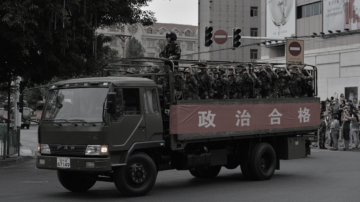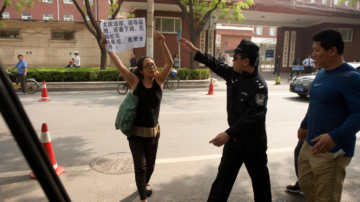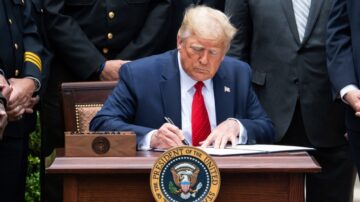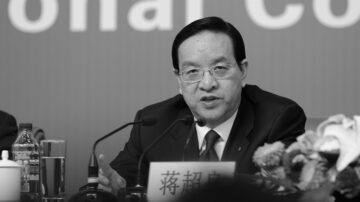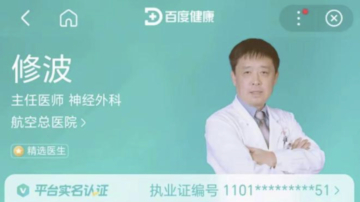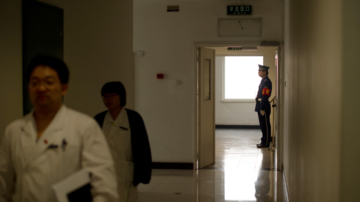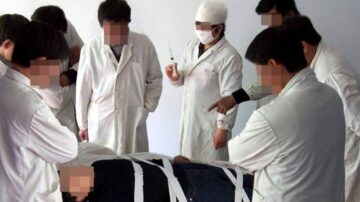【新唐人2015年02月17日讯】日前,中共中央是审议通过了公安改革方案,决定建立冤假错案责任终身追究制,加强对刑讯逼供的源头预防等。有外国媒体指出,中共此举是想走出周永康的阴影。不过,有分析认为,在中国大陆,“上有政策,下有对策”的现象非常普遍,因此对相关政策不能够抱太大期望。
2月15号,中共党媒《新华网》报导称,《关于全面深化公安改革若干重大问题的框架意见》及相关改革方案,已经中央审议通过,即将印发实施。报导说,这次改革共有七个方面的主要任务、100多项改革措施。
中共公安部负责人表示,公安执法不严格、不规范、不公正、不文明甚至权钱交易、徇私枉法等问题时有发生,将建立冤假错案责任终身追究制,严重刑事案件讯问,将要求全程录音录影,并加强对刑讯逼供和非法取证的源头预防。
中国宪政学者陈永苗:“它即使制定了这个决议,它会花很长时间,或者是拖啊,或者是有很大的阻力的话,慢慢的效果还是不那么明显。它会不断的把这些技术上的要求压在底层的民警身上。按道理,改革是改革最上层的,它不是,它一旦改革,它一定是把改革的成本往底层压,其实司法不公,基本是来自上面的权力的干涉。”
湖北维权律师张科科向《自由亚洲电台》表示,中共的司法改革往往出现“上有政策,下有对策”的现象。即使审讯有全程录像,辩护律师也无法查看这些录像,目前辩护律师查看卷宗都受到各种刁难,更别说查看全程录像了。
广东维权律师隋牧青:“不要期望有多么好,只是看现实当中,落实的会怎么样,比如说律师的会见不需要公安批准,这么多年了,都还是时常受到阻挠,削弱警权是中国司法体制改革当中特别重要的一环,现在警方的权力过大,怎么制约警方滥用权力,改革当中,如果不能注意到这个问题,可能所有的看得不错的措施,其实都没有甚么意义。”
英国广播公司《BBC》中文网指出,中共当局这次推出公安改革方案,主要是希望能使中共公安尽快走出前中央政法委书记周永康时期的“贪腐黑”阴影。
据官媒《新京报》报导,中央政法委书记孟建柱1月20号在中央政法工作会议上,曾指控其前任周永康大搞权钱、权色交易,“带坏了一批干部”。孟建柱说,政法系统不仅要深刻反思周永康案的沉痛教训,而且要彻底肃清周永康案造成的影响。
2月15号,《经济网》也刊登《中国经济周刊》一篇题为“央企,王岐山来了!”的文章指出,在周永康离开中石油后,他的家属通过周在中石油的亲信,仍可继续享有中石油的巨额利益输送。一位已退休的老中石油员工还透露,周永康执掌中石油年代,每顿宴请消费没有低于10万元人民币,而且这样的宴请几乎每天都要发生。
大陆媒体也曾从周永康的施政而非他的贪腐对他提出批评,中共党内知名自由派刊物“炎黄春秋”曾刊登法学教授崔敏的文章指出,周永康主管政法10年,中国法治建设大倒退,冤假错案达到高峰。
文章还说,周永康与薄熙来互为表里,恣意“黑打”和迫害律师,严重践踏法治,尤其把“唱红打黑”作为宣示薄熙来政绩的主要标志,显着特点包括运动式执法、严重违反诉讼程序、限制辩护和惩治律师。
北京社会活动家胡佳:“大陆的公安,有句俗语叫‘公检法不作乱,社会治安好一半’,政法体系的人,他们要是犯罪起来,对公民权利的侵害是非常非常直接,非常非常严重的,因为他涉及到剥夺你的人身自由,甚至剥夺生命。他一边可以大谈依法治国,一边又对你动用酷刑,我们真的不看好公安所出现的这条东西。”
胡佳向《自由亚洲电台》表示,如果公安部有诚意防止冤假错案和刑讯逼供,就应该对维权人士曹顺利的死亡展开独立调查,追究有关执法人员的法律责任。
采访/朱智善 编辑/陈洁 后制/陈建铭
The CCP Announces Reform Plan Against Police Brutality
Under Zhou Yongkang's Rule
The Chinese Communist Party's (CCP) Central Committee
recent approved a reform plan for the public security system.
The plan will set up a lifelong responsibility framework
on injustice cases to stop police brutality in using tortures.
Western media commented that the move is to step out
of the shadow when the system is ruled by Zhou Yongkang.
However, analysts worry that "localities always have
countermeasures against policies” in China,
people should not expect too much toward the reform.
On Feb. 15, the Xinhua News Agency reported the approval
of "Suggestions in Comprehensively Deepening Reform
on Major Issues in Public Security System"
and a reform plan by the CCP's Central Committee.
The document will be published and put to practice.
The report said, the plan set up seven major tasks
with over 100 reform measures.
A public security system spokesman said, currently
enforcement of law is not strict, standard, fair or decent.
Sometimes, trading power for money
and bending law for selfish ends also occurs.
Therefore a lifelong responsibility system
will be established for injustice cases.
Interrogation of criminal cases will also be required
to be videotaped.
The move is to stop police torturing and illegal methods
to collect evidence from its origin.
Chen Yongmiao, Chinese constitutionalism scholar:
"Even if the plan is approved, it will take a long time
to see the change and there can be huge resistance.
So the impact may not be significant
in a short period of time.
The reform plan will give more pressure on bottom-level
police with more technical requirements,
but a reform should happen from top to bottom,
rather than the opposite.
The CCP's reforms mostly leave the cost
to the bottom level.
However, in most cases judicial injustice came
from interference of high-level party officials."
Zhang Keke, a human rights lawyer in Hubei,
told Radio Free Asia that the CCP's judicial reform
frequently encounters the problem of "countermeasures
from localities against policies from the authority."
Even if interrogation is videotaped, defense lawyers
are still not able to see those videos.
Currently, defense lawyers have to overcome
many difficulties just to read case records.
It can hardly be expected that they will be given access
to videotapes.
Sui Muqing, Guangdong human rights lawyers:
"Don't expect too much on this.
The key point is how the plan is put into practice.
For example, theoretically lawyers need no police approval
to meet his clients.
However, police interference is still often seen
all these years.
Restriction of police power is a key step in the CCP's
judicial reform.
Currently, the police are given too much power
and power abuse has to be solved.
Without giving enough attention to this issue,
any reform plan that may look great can hardly be useful."
BBC Chinese website published an article commenting that
the CCP's public security system reform plan aims
at stepping out of the shadow of "Corruption and Violence"
created by former head of the Political and Legal system
Zhou Yongkang.
A Beijing News report said that Meng Jianzhu, the incumbent
secretary of the Central Political and Legal Commission
(CPLC) accused Zhou Yongkang of massively trading power
for money and sex in a commission meeting on Jan. 20.
"Zhou's acts infected many officials," said Meng.
Meng stressed that the CPLC staff must profoundly rethink
the lessons learned from Zhou's case,
and further eliminate all negative effects brought
by Zhou.
On Feb. 15, China Economy Weekly website (ceweekly.cn)
also published an article titled "Central State-Owned
Enterprises, Wang Qishan is Coming!"
The article revealed that even after Zhou Yongkang
left the petro system, his family was still given huge profits
through Zhou's followers in the system.
A retired PetroChina employee said that when ruling
the system Zhou almost never spent less than 100,000 Yuan
($16,000) for each meal party; furthermore, such party
was held almost on a daily basis.
Chinese media also criticized Zhou Yongkang's ruling
instead of corruption issues.
Yanhuang Chunqiu, a magazine renowned for its liberty
inside the CCP, published an article written by Cui Min,
a professor of law.
Cui's article commented that under Zhou Yongkang's
10-year-long governance over political and legal affairs,
China had seen great retrogression in its rule by law;
the number of injustice cases peaked during the period.
The article further said, Zhou Yongkang and Bo Xilai
had conspired to recklessly persecute lawyers
in the name of "crackdown on gangsters,"
which is serious trample of the rule of the law.
Particularly, the "Singing Red, Fighting Black" movement
was advocated as Bo's main achievements.
Cui's article summarized the salient features
of Zhou and Bo's governance such as "enforcing law
to serve political movements," "serious violation
of legal procedures", "illegal suppression of defense rights,"
and "illegal punishment of lawyers."
Hu Jia, Beijing social activist: "Chinese people have a saying,
'The social order will be twice better if police,
procuratorates and courts stop unruly acts."
If an individual from the Political and Legal system
commits any crime, it will lead to direct
and very serious violation of civil rights.
The reason is, he has the power to deprive
freedom and even human life.
He can talk "rule by the law" and meanwhile
torture anyone.
That's why we really don't have much expectation
of this reform plan."
Hu Jia told Radio Free Asia that if the public security system
wants to show its sincerity in stopping police brutality
and preventing injustice cases, they should perform
an independent investigation on the case of human rights
activist Cao Shunli and further call involved
law enforcers to be held accountable for Cao's death.
Interview/Zhu Zhishan Edit/ChendJie Post-Production/Chen Jianming
2月15号,中共党媒《新华网》报导称,《关于全面深化公安改革若干重大问题的框架意见》及相关改革方案,已经中央审议通过,即将印发实施。报导说,这次改革共有七个方面的主要任务、100多项改革措施。
中共公安部负责人表示,公安执法不严格、不规范、不公正、不文明甚至权钱交易、徇私枉法等问题时有发生,将建立冤假错案责任终身追究制,严重刑事案件讯问,将要求全程录音录影,并加强对刑讯逼供和非法取证的源头预防。
中国宪政学者陈永苗:“它即使制定了这个决议,它会花很长时间,或者是拖啊,或者是有很大的阻力的话,慢慢的效果还是不那么明显。它会不断的把这些技术上的要求压在底层的民警身上。按道理,改革是改革最上层的,它不是,它一旦改革,它一定是把改革的成本往底层压,其实司法不公,基本是来自上面的权力的干涉。”
湖北维权律师张科科向《自由亚洲电台》表示,中共的司法改革往往出现“上有政策,下有对策”的现象。即使审讯有全程录像,辩护律师也无法查看这些录像,目前辩护律师查看卷宗都受到各种刁难,更别说查看全程录像了。
广东维权律师隋牧青:“不要期望有多么好,只是看现实当中,落实的会怎么样,比如说律师的会见不需要公安批准,这么多年了,都还是时常受到阻挠,削弱警权是中国司法体制改革当中特别重要的一环,现在警方的权力过大,怎么制约警方滥用权力,改革当中,如果不能注意到这个问题,可能所有的看得不错的措施,其实都没有甚么意义。”
英国广播公司《BBC》中文网指出,中共当局这次推出公安改革方案,主要是希望能使中共公安尽快走出前中央政法委书记周永康时期的“贪腐黑”阴影。
据官媒《新京报》报导,中央政法委书记孟建柱1月20号在中央政法工作会议上,曾指控其前任周永康大搞权钱、权色交易,“带坏了一批干部”。孟建柱说,政法系统不仅要深刻反思周永康案的沉痛教训,而且要彻底肃清周永康案造成的影响。
2月15号,《经济网》也刊登《中国经济周刊》一篇题为“央企,王岐山来了!”的文章指出,在周永康离开中石油后,他的家属通过周在中石油的亲信,仍可继续享有中石油的巨额利益输送。一位已退休的老中石油员工还透露,周永康执掌中石油年代,每顿宴请消费没有低于10万元人民币,而且这样的宴请几乎每天都要发生。
大陆媒体也曾从周永康的施政而非他的贪腐对他提出批评,中共党内知名自由派刊物“炎黄春秋”曾刊登法学教授崔敏的文章指出,周永康主管政法10年,中国法治建设大倒退,冤假错案达到高峰。
文章还说,周永康与薄熙来互为表里,恣意“黑打”和迫害律师,严重践踏法治,尤其把“唱红打黑”作为宣示薄熙来政绩的主要标志,显着特点包括运动式执法、严重违反诉讼程序、限制辩护和惩治律师。
北京社会活动家胡佳:“大陆的公安,有句俗语叫‘公检法不作乱,社会治安好一半’,政法体系的人,他们要是犯罪起来,对公民权利的侵害是非常非常直接,非常非常严重的,因为他涉及到剥夺你的人身自由,甚至剥夺生命。他一边可以大谈依法治国,一边又对你动用酷刑,我们真的不看好公安所出现的这条东西。”
胡佳向《自由亚洲电台》表示,如果公安部有诚意防止冤假错案和刑讯逼供,就应该对维权人士曹顺利的死亡展开独立调查,追究有关执法人员的法律责任。
采访/朱智善 编辑/陈洁 后制/陈建铭
The CCP Announces Reform Plan Against Police Brutality
Under Zhou Yongkang's Rule
The Chinese Communist Party's (CCP) Central Committee
recent approved a reform plan for the public security system.
The plan will set up a lifelong responsibility framework
on injustice cases to stop police brutality in using tortures.
Western media commented that the move is to step out
of the shadow when the system is ruled by Zhou Yongkang.
However, analysts worry that "localities always have
countermeasures against policies” in China,
people should not expect too much toward the reform.
On Feb. 15, the Xinhua News Agency reported the approval
of "Suggestions in Comprehensively Deepening Reform
on Major Issues in Public Security System"
and a reform plan by the CCP's Central Committee.
The document will be published and put to practice.
The report said, the plan set up seven major tasks
with over 100 reform measures.
A public security system spokesman said, currently
enforcement of law is not strict, standard, fair or decent.
Sometimes, trading power for money
and bending law for selfish ends also occurs.
Therefore a lifelong responsibility system
will be established for injustice cases.
Interrogation of criminal cases will also be required
to be videotaped.
The move is to stop police torturing and illegal methods
to collect evidence from its origin.
Chen Yongmiao, Chinese constitutionalism scholar:
"Even if the plan is approved, it will take a long time
to see the change and there can be huge resistance.
So the impact may not be significant
in a short period of time.
The reform plan will give more pressure on bottom-level
police with more technical requirements,
but a reform should happen from top to bottom,
rather than the opposite.
The CCP's reforms mostly leave the cost
to the bottom level.
However, in most cases judicial injustice came
from interference of high-level party officials."
Zhang Keke, a human rights lawyer in Hubei,
told Radio Free Asia that the CCP's judicial reform
frequently encounters the problem of "countermeasures
from localities against policies from the authority."
Even if interrogation is videotaped, defense lawyers
are still not able to see those videos.
Currently, defense lawyers have to overcome
many difficulties just to read case records.
It can hardly be expected that they will be given access
to videotapes.
Sui Muqing, Guangdong human rights lawyers:
"Don't expect too much on this.
The key point is how the plan is put into practice.
For example, theoretically lawyers need no police approval
to meet his clients.
However, police interference is still often seen
all these years.
Restriction of police power is a key step in the CCP's
judicial reform.
Currently, the police are given too much power
and power abuse has to be solved.
Without giving enough attention to this issue,
any reform plan that may look great can hardly be useful."
BBC Chinese website published an article commenting that
the CCP's public security system reform plan aims
at stepping out of the shadow of "Corruption and Violence"
created by former head of the Political and Legal system
Zhou Yongkang.
A Beijing News report said that Meng Jianzhu, the incumbent
secretary of the Central Political and Legal Commission
(CPLC) accused Zhou Yongkang of massively trading power
for money and sex in a commission meeting on Jan. 20.
"Zhou's acts infected many officials," said Meng.
Meng stressed that the CPLC staff must profoundly rethink
the lessons learned from Zhou's case,
and further eliminate all negative effects brought
by Zhou.
On Feb. 15, China Economy Weekly website (ceweekly.cn)
also published an article titled "Central State-Owned
Enterprises, Wang Qishan is Coming!"
The article revealed that even after Zhou Yongkang
left the petro system, his family was still given huge profits
through Zhou's followers in the system.
A retired PetroChina employee said that when ruling
the system Zhou almost never spent less than 100,000 Yuan
($16,000) for each meal party; furthermore, such party
was held almost on a daily basis.
Chinese media also criticized Zhou Yongkang's ruling
instead of corruption issues.
Yanhuang Chunqiu, a magazine renowned for its liberty
inside the CCP, published an article written by Cui Min,
a professor of law.
Cui's article commented that under Zhou Yongkang's
10-year-long governance over political and legal affairs,
China had seen great retrogression in its rule by law;
the number of injustice cases peaked during the period.
The article further said, Zhou Yongkang and Bo Xilai
had conspired to recklessly persecute lawyers
in the name of "crackdown on gangsters,"
which is serious trample of the rule of the law.
Particularly, the "Singing Red, Fighting Black" movement
was advocated as Bo's main achievements.
Cui's article summarized the salient features
of Zhou and Bo's governance such as "enforcing law
to serve political movements," "serious violation
of legal procedures", "illegal suppression of defense rights,"
and "illegal punishment of lawyers."
Hu Jia, Beijing social activist: "Chinese people have a saying,
'The social order will be twice better if police,
procuratorates and courts stop unruly acts."
If an individual from the Political and Legal system
commits any crime, it will lead to direct
and very serious violation of civil rights.
The reason is, he has the power to deprive
freedom and even human life.
He can talk "rule by the law" and meanwhile
torture anyone.
That's why we really don't have much expectation
of this reform plan."
Hu Jia told Radio Free Asia that if the public security system
wants to show its sincerity in stopping police brutality
and preventing injustice cases, they should perform
an independent investigation on the case of human rights
activist Cao Shunli and further call involved
law enforcers to be held accountable for Cao's death.
Interview/Zhu Zhishan Edit/ChendJie Post-Production/Chen Jianming

